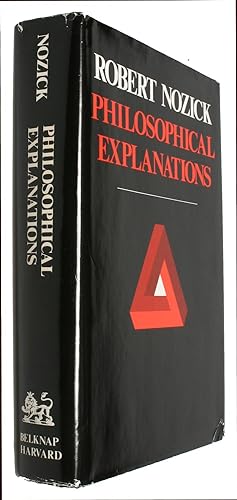About this Item
Cambridge, Massachusetts, 1981. Royal 8vo. Orig. full grey cloth w. white lettering to spine. Orig. black, red and white dust-jacket, not price-clipped. A few small tears to capitals and corners of dust-jacket w. very minor loss. Binding and internally near mint. XII, (2), 764, (1) pp. First edition, presentation copy from the author "For Iz/ Fondly,/ Bob", dated "August, 1981", of this highly important work of modern day philosophy. This is Nozick's second book, and it constitutes his most influential contribution to philosophy outside of political theory. In this work Nozick develops his "externalist" theory of knowledge. The work covers many aspects of metaphysics and ethics, but especially the metaphysics of personal identity occupies a central role in this main work, which comes second in importance to only his seminal "Anarchy, State and Utopia" (1974). Robert Nozick (1938 -2002) was an American philosopher, born in Brooklyn, and Pellegrino University Professor at Harvard University. He was a thinker with wide-ranging interests, and he is now considered one of the most important and influential political philosophers of the Anglo-American analytic tradition, together with John Rawls. In his Philosophical Explanations, which received the Phi Beta Kappa Society's Waldo Emerson Award, Nozick brings forth the now so famous, but then novel and (still) controversial accounts of knowledge, free will, personal identity and meaning of life. The "Philosophical Explanations" is thus a groundbreaking work in several ways:According to traditional theories of knowledge, a knower S knows a proposition p if and only if S believes p, p is true, and S is justified in believing p. The problem with the three instances here is the last, namely what does "being justified in believing" entail? Nozick here comes up with a unique contribution that has been of great importance to epistemologists ever since: He determines this belief negatively. It is the counterfactuals that make the true belief count as knowledge, i.e. 1) S would not believe p, if p were not true (the "variation" condition), and 2) under different circumstances, S would still believe and would not believe the negation of p (the "adherence" condition). Nozick determines a belief that fulfills these conditions as one that "tracks the truth". Furthermore, Nozick uses his analysis in answering skepticism, and controversially denies the "closure principle" (if S knows that p and that p entails q, then S knows that q), bringing him great (and not necessarily positive) fame among epsitemologists. Thus Nozick here presents an epistemological system designed to deal with Gettier-style problems as well as those posed by skepticism, and his argument became highly influential. Furthermore, in "Philosophical Explanations", Nozick also presents his "closest continuer" theory, his seminal contribution to the debate of personal identity. The question of personal identity has a long tradition among philosophers and can stem from puzzles like: If person A wakes up in the body of person B, who is he? Is he A, or is he B? Nozick comes up with an answer to such questions, namely that it is the later person who "most closely continues" the earlier one who is the one truly identical to the latter. Of course, this leaves room for interpretation, and so in Nozick's view, personal identity comes to partly depend upon the factors that are most important to the answerer, e.g. bodily or psychological properties.Apart from the groundbreaking ideas presented in this work, it is also famous for posing numerous questions, the answers to which are often left to the reader, for using non-philosophical works to illustrate philosophical points, and not least for the curious style, in which it is written."This book puts forward its explanations in a very tentative spirit" not only do I not ask you to believe they are correct, I do not think it important for me to believe them correct, either. Still, I do believe, an.
Seller Inventory # 36286
Contact seller
Report this item

